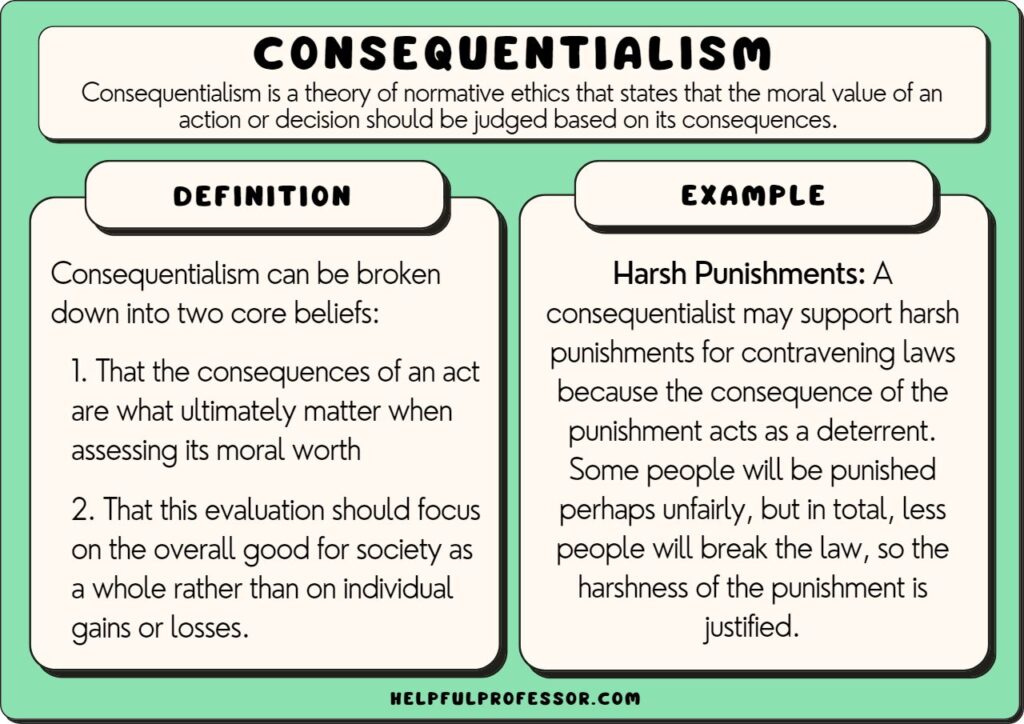Consequentialism is a moral theory that evaluates the rightness or wrongness of actions based on their outcomes. This ethical framework posits that the consequences of an action are the primary basis for any judgment about its moral value. In essence, if the results of an action yield positive outcomes, then the action is deemed morally right, while actions that lead to negative consequences are considered wrong. This approach contrasts with deontological ethics, which focuses on adherence to rules or duties regardless of the results.
At its core, consequentialism challenges individuals and societies to consider the broader impact of their decisions. This perspective can lead to a more pragmatic approach to ethics, where the focus is on achieving the greatest good for the greatest number. Within this framework, various sub-theories exist, such as utilitarianism, which emphasizes maximizing overall happiness. However, this emphasis on outcomes raises important questions about justice, rights, and individual well-being.
In today's complex world, understanding consequentialism is crucial as we navigate moral dilemmas in various fields, from healthcare to environmental policy. As we explore the nuances of this ethical theory, it becomes clear that the implications of consequentialist thinking extend far beyond theoretical discussions, influencing real-world decisions that shape our lives and communities.
What is the Historical Background of Consequentialism?
Consequentialism has roots in ancient philosophical thought, but it gained prominence during the Enlightenment. Philosophers like Jeremy Bentham and John Stuart Mill were pivotal in shaping utilitarianism, a prominent branch of consequentialism. Bentham introduced the idea of the "greatest happiness principle," which asserts that actions are right if they promote happiness and wrong if they produce the opposite. Mill expanded on Bentham's ideas by differentiating between higher and lower pleasures, emphasizing qualitative aspects of happiness.
How Does Consequentialism Differ from Other Ethical Theories?
Unlike deontological ethics, which focuses on rules or duties, consequentialism evaluates actions based on their outcomes. Here are some key differences:
- Focus on Outcomes: Consequentialism prioritizes the end results of actions over intentions or adherence to moral rules.
- Flexibility: It allows for a more adaptable approach to moral dilemmas, as actions may be justified if they lead to positive consequences.
- Quantitative vs. Qualitative: Consequentialism can be both quantitative (utilitarianism) and qualitative (higher pleasures) in its assessment of outcomes.
What are the Strengths of Consequentialism?
Consequentialism offers several advantages that make it a compelling ethical framework:
- Pragmatic Decision-Making: It encourages individuals to consider the real-world implications of their choices, promoting a results-oriented mindset.
- Encourages Altruism: By focusing on the well-being of others, consequentialism fosters a sense of responsibility toward the greater good.
- Adaptability: Its flexible nature allows for adjustments based on changing circumstances and new information.
What are the Criticisms of Consequentialism?
Despite its strengths, consequentialism faces significant criticisms:
- Neglect of Rights: Critics argue that it may overlook individual rights and justice in favor of overall utility.
- Unpredictability of Outcomes: The uncertainty of predicting consequences can lead to ethical dilemmas and moral confusion.
- Potential for Justifying Harm: It may justify harmful actions if they produce a perceived greater good.
How Does Consequentialism Apply in Real Life?
Consequentialism is not merely an academic theory; its principles are applied in various real-world contexts. For instance, in public policy, lawmakers often weigh the potential outcomes of legislation to determine its overall benefit to society. In healthcare, medical professionals may prioritize treatments based on the expected benefits to patients versus the risks involved. Additionally, businesses may adopt consequentialist principles in corporate social responsibility initiatives, aiming to create positive societal impacts while achieving profitability.
Can Consequentialism Lead to Moral Dilemmas?
Yes, consequentialism can indeed lead to moral dilemmas. For instance, in a situation where sacrificing one life could save many, a consequentialist framework may suggest that the sacrifice is justified. Such scenarios challenge our intuitions about morality and force individuals to grapple with difficult ethical decisions. These dilemmas often highlight the tension between individual rights and the collective good, raising profound questions about the limits of consequentialist reasoning.
What is the Future of Consequentialism?
The future of consequentialism remains a topic of active discussion among ethicists and philosophers. As society faces new challenges, such as climate change, technological advancements, and global inequality, consequentialist perspectives will likely play a crucial role in shaping ethical frameworks. By emphasizing outcomes, consequentialism can guide decision-making processes that prioritize long-term benefits for individuals and communities alike.
Conclusion: Is Consequentialism the Best Ethical Approach?
Ultimately, whether consequentialism is the best ethical approach depends on the context and the values held by individuals and societies. Its focus on outcomes offers valuable insights into moral decision-making, while also presenting challenges that must be carefully navigated. As we continue to explore the complexities of ethics, consequentialism will undoubtedly remain a significant player in the ongoing dialogue about what it means to lead a moral life.




